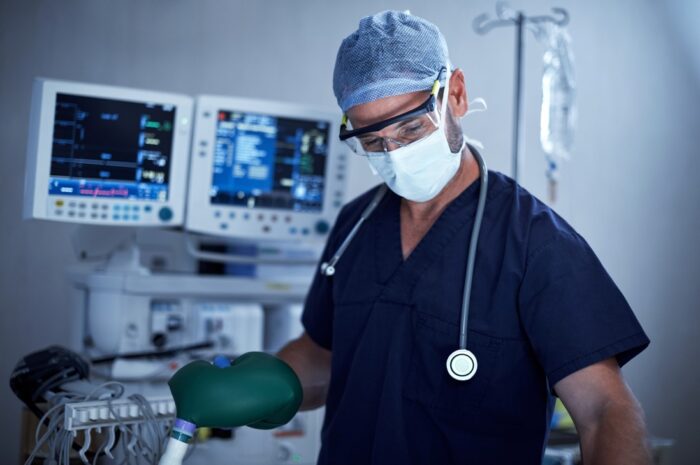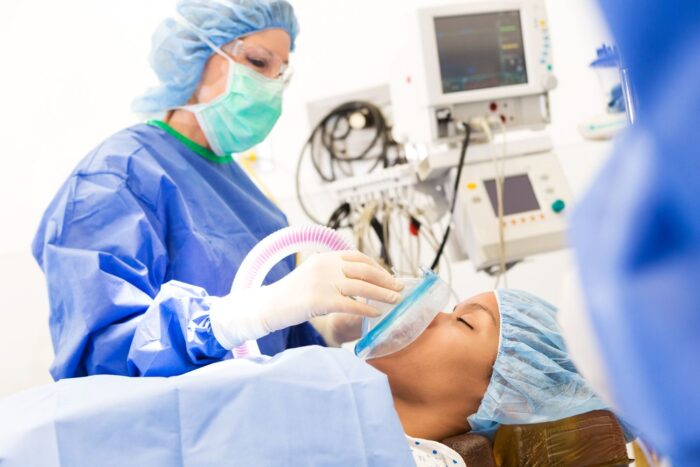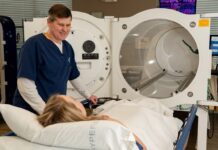
An integral part of knee replacement surgery is using anesthesia, often general anesthesia, to ensure patient comfort and safety during the operation. We will examine what to expect from general anesthesia during knee replacement surgery.
An integral part of knee replacement surgery is using anesthesia, often general anesthesia, to ensure patient comfort and safety during the operation. We will examine what to expect from general anesthesia during knee replacement surgery.
Understanding General Anesthesia
General anesthesia is administered to ensure that patients are pain-free, comfortable, and unaware of the surgery. The process involves using various medications, including sedatives, analgesics, and muscle relaxants, typically administered through an intravenous line (IV) or inhaled gases.
Before Surgery ─ Pre-Anesthetic Assessment
You will meet with an anesthesiologist before surgery for a pre-anesthetic assessment. This is important to ensure your safety during the operation. The anesthesiologist will review your medical history, current medications, allergies, and previous experiences with anesthesia. They may also order tests, such as blood work or an EKG, to assess your overall health status.
Day of Surgery ─ Administering Anesthesia
The anesthesiologist will administer the anesthesia to help you relax, followed by the anesthetic agents to induce unconsciousness. Once you are asleep, a breathing tube may be inserted to help you breathe during the operation. The anesthesiologist will monitor your vital signs throughout the surgery to ensure your safety.

During Surgery ─ The Role of the Anesthesiologist
During the surgery, the anesthesiologist manages your anesthesia and monitors your vital signs. They adjust the anesthesia as needed to ensure you remain unconscious and comfortable. They also monitor your heart rate, blood pressure, breathing, and oxygen levels to promptly detect and manage any potential complications.
After Surgery ─ Waking Up from Anesthesia
After the surgery, the anesthesiologist will stop the anesthesia, and you will gradually wake up in the recovery room. You may feel groggy, disoriented, or sleepy at first. It’s also common to experience side effects such as dry mouth, sore throat, nausea, or chills. These side effects are usually temporary and managed with medications.
Recovery from Anesthesia
Recovery from general anesthesia is a process that varies among individuals, largely dependent on factors such as the specific anesthetic drugs used, the individual’s overall health, and the length of the surgical procedure. Immediately after the surgery, most people can expect to be awake within an hour. This period, often spent in a post-anesthesia care unit (PACU), involves close monitoring by healthcare professionals to ensure vital signs are stable and any pain is well-managed. Despite regaining consciousness, patients may still feel groggy, disoriented, or sleepy due to the residual effects of the anesthesia.
In the days following the surgery, the drugs used for anesthesia can remain in your body, leading to feelings of tiredness, weakness, or dizziness. These effects should gradually diminish, but taking certain precautions during this period is important. For instance, it’s recommended to have someone drive you home after the surgery, as operating a vehicle is unsafe due to the anesthesia’s potential lingering effects.
Additionally, having someone stay with you for the first 24 hours after surgery is advisable. This person can assist with basic tasks and provide support as you navigate the initial recovery period, ensuring safety and comfort as the effects of the anesthesia fully wear off.

Risks and Benefits of General Anesthesia
General anesthesia is generally safe, but like any medical procedure, it carries risks. These can include allergic reactions, breathing problems, and, very rarely, serious complications such as heart attack or stroke. The anesthesiologist will discuss these risks with you during the pre-anesthetic assessment.
The benefits of general anesthesia include the absence of pain and awareness during the surgery, which can make the surgical experience less stressful for patients. It also allows the muscles to relax completely, facilitating the surgical procedure.
Understanding the risks and benefits of general anesthesia is essential to preparing for knee replacement surgery. While general anesthesia is generally safe and widely used in various surgical procedures, it’s important to acknowledge that, like any medical procedure, it carries certain risks.
The potential risks associated with general anesthesia can range from mild to severe. These include:
- Allergic reactions ─ Although rare, some patients may have an allergic reaction to the anesthetic drugs. This can result in skin rash, swelling, difficulty breathing, or a drop in blood pressure.
- Breathing problems ─ General anesthesia often requires a breathing tube, which can sometimes lead to complications such as a sore throat, hoarseness, or, in rare cases, injury to the mouth or teeth.
- Serious complications ─ Although very rare, general anesthesia can lead to heart attack, stroke, or pneumonia. These risks are higher in patients with pre-existing medical conditions.
The anesthesiologist will discuss these risks with you during the pre-anesthetic assessment.

Anesthesia at Kardiolita Hospital
At Kardiolita Hospital, patient safety and comfort are the top priorities. The hospital’s team of experienced anesthesiologists is committed to providing the highest standard of care. They work closely with patients, surgeons, and the nursing team to ensure a safe and comfortable surgical experience.
Kardiolita Hospital also specializes in assisting patients from abroad, including Ireland. The hospital provides comprehensive services, from pre-anesthetic assessment to postoperative care, to ensure a smooth process for international patients. With its state-of-the-art facilities and commitment to patient-centered care, Kardiolita Hospital is a trusted choice for knee replacement surgery patients.
In conclusion, general anesthesia plays a crucial role in knee replacement surgery. By understanding what to expect, you can better prepare for your surgery and participate more actively in your care. Remember, anesthesia aims to ensure your comfort and safety during the operation. With the right care and preparation, you can confidently approach your knee replacement surgery.








